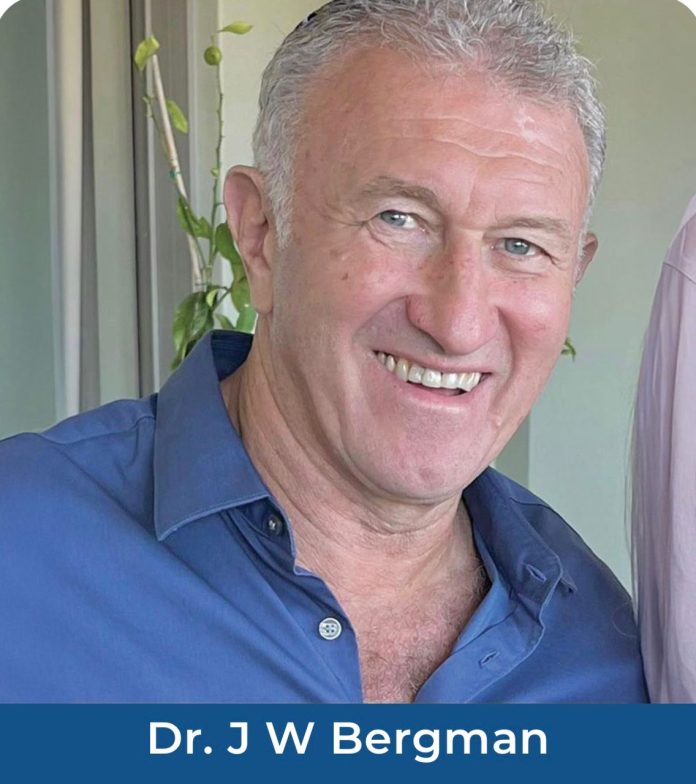Today we publish the results of a weeks long investigation into Bergman Ross & Partners (BRP), a Radiology company from Cape Town, South Africa. The company also trades in Ghana as Quest Medical Imaging (QMI), based in Accra. In April and June of this year the Business Day, which is the most influential business publication in South Africa, published a story about Bergman Ross & Partners (BRP), and led by Dr Jack Bergman (https://www.businesslive.co.za/bd/companies/healthcare/2025-04-25-bee-watchdog-probes-netcare-service-provider-over-fronting-allegations/ and https://www.businesslive.co.za/bd/companies/healthcare/2025-06-25-council-finds-netcare-provider-brp-guilty-of-unprofessional-conduct/).
This company was found guilty by the Health Professions Council of South Africa (HPCSA) for unprofessional conduct, engaging in undesirable business practices, and receiving fees for services not rendered, for which fines were imposed. They are also being investigated by the Broad-Based Black Economic Empowerment Commission for fronting. In South Africa, using a black person as a front to acquire a business opportunity is a crime, which can lead to imprisonment if found guilty.
It has been reassuring to see that South Africa, since assuming the G20 Presidency on 01 December 2024, has been singularly resolute in affirming the 4 strategic pillars underpinning its participation, which are national interests, the African agenda, South-South cooperation, and multilateralism. Its stewardship is guided by the theme of ‘Solidarity, Equality and Sustainability’.
With twice our population size, it is to this end of advancing solidarity and the African agenda that developments in the South African healthcare landscape should be of interest to Ghana, especially given the historical racial disparities that prevail, as evidenced by the ongoing economic dominance of the local European population and strained public resources.
However, as we continue to collaborate with other African countries in pursuit of developing our own local private and public industries, we also have to avoid repeating the mistakes made elsewhere. In particular, we have to viciously guard our independence, avoid exploitation, root out potential criminality, and mitigate the perpetuation of the colonial legacy.
According to newspaper stories and documents filed at the High Court, BRP were invited into a business opportunity by a black Radiologist, Dr Motshudi, with the aim of setting up a practice in one of the main private hospital groups, called Netcare. They were offered 50% equity, and BRP assisted with a letter of financial guarantee and working capital of indeterminate value. Post awarding of the contract the two parties then borrowed money from the bank to start the business, which is called Motshudi Bergman Ross (MBR). The naming of the company demonstrates the primacy of Motshudi in the relationship, unless this was a fronting enterprise.
About three years into the practice BRP then secretly arrogated to itself 74% of equity in the business, far in excess of the initial verbal agreement between the parties, and despite being the ones invited to participate in the opportunity. They did this even though it is Motshudi and local Associates who perform the revenue-generating work that ultimately paid off the establishment loan. In South Africa some areas of specialisation, like Radiology and Pathology, are concentrated amongst a few players and monopolies.
BRP’s conduct therefore undoubtedly undermines the country’s transformation agenda by wanting to maintain ownership patterns that obtained during apartheid. This view is supported by a statement issued by the black co-owner of the hospital license, who is quoted as saying, “It was never envisaged, or even discussed, that Motshudi would be a junior partner in this venture.” He further went on to say that “On the contrary, I would not have supported the joint proposal if I had been aware that Motshudi was not going to be, at the very least, an equal if not a majority partner, given the transformation agenda that drove my support for him.”
Despite this unequivocal statement of support by the entrepreneur who introduced the business opportunity to Motshudi, BRP persists in its rogue conduct. What is most egregious is that BRP knows fully well that they never discussed this equity distribution with Motshudi. Affidavits and transcripts of meetings between Motshudi, Jack Bergman, and Paul Koski, the BRP accountant, have been shared with us by South African investigative journalists and other sources, and these are quite revealing.
For example, in a meeting held on 06 October 2021, Koski, in the presence of Bergman, explicitly confirms to Motshudi that they know that he, Motshudi, did not agree to the equity, and that any documentation that exists to that effect was used inadvertently. The assertion that Motshudi did not know about the contested equity is surprisingly also repeated by BRP in some of its own court filings.
In paragraph 31.2.2 of an answering affidavit filed under Case No. 2025-001371, BRP confirms that it “*determined to allocate itself 74% of MBRI’s shareholding, and 26% would be allocated to Dr Motshudi”*. In a separate affidavit under Case No. 036875/2022, they affirm in paragraph 64 that they “took the view that Dr Motshudi should be entitled to just-over 25% of the shareholding in MBR.” It is obvious Motshudi was not there when these discussions and determinations were made.
Additionally, Bergman and Koski further concede in an email from 05 December 2021 that Motshudi did not know about these ratios until when he unexpectedly saw them in 2018. The question then becomes, if Motshudi never discussed the 74%/26% with them, by their own admission, then why persist with the claim in public?
Prejudicial conduct appears to be a perennial problem in South Africa. For example, a recent report by a government-led enquiry found that medical insurance companies in South Africa acted in a “racially discriminatory manner towards black healthcare providers”. This finding comes on the back of the South African Competition Commission’s Health Market Inquiry report, released in September 2019. This report exposed even more deep-seated institutional problems in private healthcare, some of which indirectly perpetuate racial exclusion and lack of access to healthcare. Unfair practices and corporate bullying is not only by medical insurance companies.
The recent Ninth Tokyo International Conference on African Development (TICAD 9), held in Japan on 20-22 August 2025, yet again highlighted the need for African countries to collaborate with each other as they confront common developmental challenges. This is reinforced by the 28th edition of the United Nations’ World Population Prospects (WPP) report, which states that by 2050 more than 25% of people in the world will be African. The report further goes on to say that of the eight countries that will account for more than half of the global population growth between now and 2050, five of them are in Africa.
At that stage, the total African population is expected to reach 2.5 billion people. This population growth and demographic dividend present the continent with massive opportunities and challenges. The challenges lie in the fact that all these people have to be provided with food, healthcare, education, housing, sanitation, and work opportunities. This is more so because the average life expectancy in Africa has increased from 43 to 66 years, and is expected to increase to 70 years by 2050.
It is for this reason that policy makers need to place special focus on healthcare, in line with Sustainable Development Goal 3, which is to “Ensure healthy lives and promote well-being for all ages.”
In phase 2 of our investigation, we plan to focus on the US$3 million loan BRP received from the International Finance Corporation (IFC) to fund QMI in Accra. The IFC is a subsidiary of the World Bank, and it funds healthcare and other projects in developing economies (https://hfg.custompublish.com/ifc-invest-us3-million-in-brps-quest-medical-imaging-to-enhance-medical-diagnostics-in-ghana-healthcare-africa.6406930-531663.html). This is because if the allegations made against them in the documents we have seen are true, then it should be of interest to the authorities what proof they used to verify that they hold the shares they used as security.
It is suspected that BRP might have submitted documents from 2018, even though there is a recording and transcript in which Paul Koski makes the following statements, “Let us just for the purpose of this… after this we can tear it up. This document here is only going to be used for this tender….”* Koski further goes on to say, “In fact, I am happy that you can hang on to the original documents. I will tell Jack, you know, one thing about Jack, and even myself is, you know, we are not cast in stone on the issue… Can I tell you something? I am going to document it that we have not agreed to it. We need to have the discussion. And I will discuss with Jack, and I know he will be quite comfortable”.
Internal IFC documents confirm that the loan was approved on 7 May 2021, three years after Motshudi had already disputed his 26% equity in MBR. This means that BRP might have submitted to the IFC documents it knew fully well they had said should be “torn up”, regarding shares they were unreservedly aware were contested. Was this critical information disclosed to the IFC? Further details about the context of this conversation will be revealed after we have verified some of the information in our possession.
We also intend to focus on BDO, BRP’s auditors. South Africa has a track record of auditing companies not performing the appropriate due diligence on the entities they audit. This is because after the HPCSA confirmed that they cannot own the shares they purported to hold, BRP suddenly claimed not to have held shares in Motshudi Bergman Ross all along, raising questions about the role of the auditing company, and how dividends were paid to an entity that was not a shareholder.
Moreover, they claimed that the IFC told them they cannot dilute their equity in Motshudi Bergman Ross, yet now they have filed papers in a South African court denying that they ever owned those very shares, just so they can avoid regulatory scrutiny. Knowing that corporate delinquents do not change their conduct even when they cross borders, our investigations will also delve deep into BRP’s arrangements in Ghana, the rest of Africa, and anywhere else they might have businesses.
On 27-29 August 2025 South Africa hosted INTERPOL’s 27th African Regional Conference, ironically held in Cape Town, where BRP is domiciled. The conference placed particular focus on transnational organised and financial crimes, including money laundering. Illicit financial flows and misrepresentations have been identified as one of the causes of Africa’s underdevelopment, and it is for that reason that Ghanaian authorities and financial regulators should closely monitor all transactions that might be a front for criminality.
In February 2023 South Africa was placed on the Financial Action Task Force’s (FATF) grey list due to significant deficiencies in its anti-money laundering and counter-terrorism financing regime. If phase 2 of our investigation reveals fraudulent misrepresentation to the IFC, which is a subsidiary of the World Bank, it will most likely trigger interest from the FBI in America, and it will raise concerns about South Africa’s interventions to stem the tide of corporate crimes.






